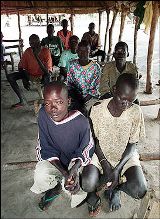FACTBOX- Child demobilization in Southern Sudan
April 21, 2006 (KHARTOUM) — As part of the Comprehensive Peace Agreement, the parties have committed themselves to release and demobilize all children associated with armed forces and groups.

|
|
Sudanese boys, former soldiers for Sudan People’s Liberation Army, sit in their classroom in the Deng Nhial Primary School in Rumbek, South Sudan. |
While active demobilization of children is new in the north, about 15,000 children have been demobilized in the south since 2001.
In accordance with the Comprehensive Peace Agreement, all demobilization will be through the Disarmament, Demobilization and Reintegration (DDR) authorities, while the international community’s role is to support this process.
The child DDR policy – Since the signing of the Comprehensive Peace Agreement, the SPLM has developed a child DDR policy that defines how children will be demobilized, and how reintegration support will be channelled to communities.
Definition – For the child DDR process in Southern Sudan, definitions from the Cape Town Annotated Principles, which are globally used by governments, the United Nations and non-government organisations and the International Criminal Court are used, and do not refer any specific armed force or group.
The definition of “children associated with armed forces and groups” includes all children below the age of 18 who is part of any kind of regular or irregular armed force or armed group in any capacity, including but not limited to cooks, porters, messengers, and those accompanying such groups, other than purely as family members. It includes girls recruited for sexual purposes and forced marriage. It does not, therefore, only refer to a child who is carrying or has carried arms.
Who will demobilize children in Southern Sudan? – The DDR authorities are responsible for all child demobilization in Southern Sudan. Child demobilization will be carried out by regional teams of the DDR Authorities. The teams will be headed by Regional Child DDR Officers who will lead local Implementation teams, comprising local military and civil authorities, to demobilize children.
Identification and verification – The DDR authorities will identify children for demobilization together with senior military officers. The DDR authorities will carry out verification at barracks that all children have been removed. The DDR authorities can also receive reports from individuals and organizations if children have not been demobilized. The DDR authorities will pay particular attention identification of girls associated with armed forces, as experience shows that this group is often missed.
Registration – The DDR authorities will register children associated with armed groups and forces, as teams from the DDR authorities reach armed forces. This information will be stored in a database maintained by the DDR authorities.
Tracing – For most children associated with armed forces and groups in southern Sudan, no long-distance tracing is necessary. When family tracing is necessary, information for tracing will be provided by the DDR authorities to agencies with capacity for tracing where the child’s parents or community is believed to be.
Release and demobilization – DDR authorities set dates for release or demobilization as soon as the registration and tracing are completed. When tracing is not necessary, the date will be set as soon as registration is completed. Children should not be moved from where they are found until tracing is completed, as there is no interim care for children.
DDR authorities are responsible for the return of the child to its community, and may request logistical support from UNICEF or NGOs for transport of children over long distances. Especially with girls, the DDR authorities need support to ensure that transport home is done in a way that does not expose girls to risks. Risky situations include situations where no women are available to participate in the process.
After release or demobilization, children do not retain any rank obtained in an armed force or group.
Before release or demobilization, children must hand over any military effects and firearms to the armed force or group the child has been associated with, regardless of how the child obtained the military effects, and regardless of whose property the military effects were when the child became associated with the armed force.
Reintegration – Drawing on lessons learned from previous experiences, all reintegration support to children from armed forces must go through communities.
The responsibility of the DDR authorities is to ensure that children access reintegration support and broader social services in communities that receive them on equal terms with other children. The DDR authorities will track, follow up, and through cooperation and coordination with Civil Authorities, UN agencies and NGOs, ensure that children who are released or demobilized are not discriminated against. This applies especially to girls.
While it remains the responsibility of the DDR authorities to reunify children with their families and communities, the DDR authorities will appeal for the support of civil authorities and NGOs to ensure that children can benefit from services that are available in the communities. When children are reunified, civil authorities and NGOs will be notified of the presence of the children in their communities.
Reporting incidents of recruitment or re-recruitment – If children are recruited into any armed forces or groups in Southern Sudan, this should be reported to the Southern Sudan DDR authorities immediately. This will enable authorities to intervene with the recruiters and have children released.
(UNICEF/ST)
